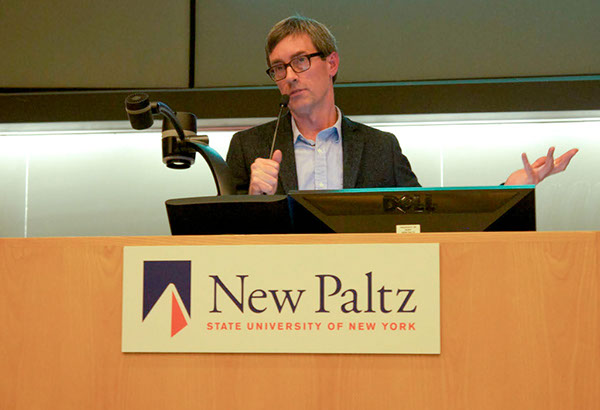
On Monday, Nov. 17 a forum opposing the proposed Pilgrim Pipeline Project — a construct of bi-directional underground pipelines spanning 178 miles purposed for transporting crude oil and refined petroleum between Albany, New York and Linden, New Jersey, crossing the Hudson Valley — was held in Lecture Center 104, focusing on the project’s negative impact on communities the pipeline is set to pass through.
The panel consisted of Rosendale Councilwoman and Citizens for Local Power member, Jen Metzger, Riverkeeper Program Director Phillip Musegaas, Eastern Program Coordinator of Earthworks’ Oil & Gas Accountability Project Nadia Steinzor and Outreach Coordinator for Sane Energy Project Kim Fraczek. Each panelist discussed a different facet of the pipeline’s potential effects if the project is approved.
Criticism for the pipeline project stems largely from the pipeline’s intended purpose of carrying Bakken crude oil — a type of crude oil extracted from North Dakota’s Bakken shale field by means of hydro-fracking and shown to be more volatile than other extracted oils, according to the U.S. Department of Transportation, whose Pipeline and Hazardous Materials Safety Administration agency oversees pipeline transit operations across the country.
Currently, Bakken crude is transported by rail car and shipping barges from Albany to refineries in New Jersey, Musegaas said in his presentation. Pipeline project officials have claimed that the pipeline would be a safer mode of transportation than rail or barge. Musegaas disputed this claim and said that when pipeline spills take place, it results in more oil per-mile than rail or barge spills because of the vast difference in volume, though the explosive risk is less when moved by pipeline.
However, Musegaas that even if the pipeline was to be constructed, transport by rail and barge would not decrease, as the pipeline is meant primarily to increase capacity of transporting, not as a replacement to the other means of transportion. Statistically, the more oil that is shipped, the more oil will spill or explode, he said. Musegaas said the current rail tankers employed in oil transport are not equip to handle Bakken crude’s more volatile properties.
“The big issue with Bakken crude is that it has a very high volatility and a very low clashing point, which basically equates it to the flammable and explosive potential of gasoline,” Musegaas said. “The tanker cars that rail companies use to transport water and juice are the same ones they use to ship Bakken crude. They are not designed to handle it and as a result we have these accidents.”
Musegaas cited multiple cases of tanker transport accidents, including the Lac-Megantic, Quebec rail disaster in July 2013 in which a freight train carrying Bakken crude oil derailed, causing fires and explosions that resulted in 42 deaths and 30 destroyed buildings.
The current mapping of the pipeline would largely follow the New York State Thruway, affecting Albany, Greene, Orange and Ulster counties. Since early summer, citizen accounts in New York and New Jersey have reported that land surveyors claiming to represent the project’s development company, Pilgrim Pipeline Holdings LLC, have come to residents’ homes seeking access to their property and threatening legal action should they refuse.
Metzger said she herself first became aware of the proposed pipeline project after a Rosendale resident who had been contacted by pipeline surveyors informed her of their intentions.
“[The resident] received a letter from a company called Pilgrim that was looking to get on their property to survey it for the center line of the pipeline,” Metzger said. “This letter was written in such a way to suggest that the resident didn’t have any choice and that they were being contacted as a courtesy.”
Metzger called the company and identified herself as a municipal official, asking if the company had a legal right to enter people’s private property without permission and on what basis they were allowed that right.
“The answer I got was ‘we are a transportation company and we have rights,’” Metzger said. “Basically they didn’t answer the question but I can tell you that they don’t have that right — at least not at the present time.”
Metzger composed a resolution for municipalities opposing the Pilgrim Pipeline, of which the Town of New Paltz has adopted as of Nov. 19. The resolution lists various counterpoints to the benefits suggested by pipeline officials as a basis for their opposition, including environmental, health and safety concerns. Copies of the passed resolution are then forwarded to state and federal government offices.
According to Metzger, the permitting process for the pipeline’s construction will begin sometime in December. Currently, the proposal is early in its planning stages and have not been made official by any government body, making the presence of surveyors approaching residents “deceitful and kind of bullying.” Metzger advised anyone contacted by pipeline representatives to “just say no.”
